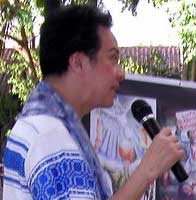Edsa Veterans on Another Edsa
Singer-composer and
university professor Jim Paredes, National Museum curator John Silva, and
poet-musician Jess Santiago are veterans of previous Edsa uprisings. What
do they think of the possibility of another Edsa uprising?
BY ALEXANDER MARTIN REMOLLINO
Bulatlat
 Singer-composer and
university professor Jim Paredes. National Museum curator John Silva.
Poet-musician Jess Santiago. They are all veterans of the popular
uprisings that have come to be known as the Edsa uprisings or the People
Power uprisings.
Singer-composer and
university professor Jim Paredes. National Museum curator John Silva.
Poet-musician Jess Santiago. They are all veterans of the popular
uprisings that have come to be known as the Edsa uprisings or the People
Power uprisings.
In February 1986,
about a million people trooped to Edsa – near Camp
Aguinaldo, the general headquarters
of the Armed Forces of the Philippines (AFP) – to protect a small group of
soldiers who had withdrawn support from the Marcos regime following what
was said to be a fraud-ridden snap election. Marcos had ordered an attack
on this group of soldiers, led by then Defense Minister Juan Ponce Enrile
and then Constabulary chief Fidel V. Ramos.
The 1986 Edsa
uprising was the culmination of a long anti-dictatorship struggle that
began as early as before the declaration of martial law in 1972. Marcos
had displayed authoritarian tendencies as early as 1969.
In January 2001,
people again trooped to Edsa to oust another president, this time Joseph
Estrada. They chose Edsa for its historical meaning.
The president had
been facing impeachment charges for corruption, bribery, betrayal of
public trust, and culpable violation of the Constitution.
This time the fight
was largely against corruption, although Estrada himself had displayed
authoritarian tendencies as well as partiality to the family and cronies
of the late Ferdinand Marcos and this, too, was a major issue against his
administration.
Nineteen years have
passed since the first Edsa uprising, and four years since the second one.
The people continue to rail against corruption in government and
violations of the most basic democratic rights.
And now several
political quarters ranging from Left to Right are on the verge of calling
for another Edsa uprising, in the wake of the surfacing of CDs containing
taped conversations said to involve President Gloria Macapagal-Arroyo and
former Commission on Elections (Comelec) Commissioner Virgilio Garcillano.
The conversations are said to have hints on cheating in the 2004 election.
There are calls for the ouster of another president. What do the likes of
Paredes, Silva, and Santiago think of this – they who were at Edsa?
Paredes, a member of
the singing trio Apo Hiking Society together with fellow Ateneans Danny
Javier and Buboy Garovillo was involved in broad anti-dictatorship
campaigns during the Marcos years. He joined both Edsa uprisings.
“I joined Edsa 1 with
a full heart and spirit because I believed it was our chance at getting
back our democratic institutions, and I think Edsa 1 was successful in
that,” he said. “I joined Edsa 2 after much thinking and with much
consideration because I felt it was important to tell our leaders that we
cannot have a government like that, we need a more decent government.”
He is disappointed at
where the country is after the two Edsa uprisings. He attributes the
current state of affairs to “laziness on our part.” We wouldn’t be where
we are now, he says, if we had really followed the “revolutionary spirit”
of Edsa 1. “We thought the work was over,” he said. “That’s what went
wrong.”
He does not deny that
he is suffering from what some political analysts have described as
“People Power fatigue.”
Does he regret
joining the two Edsas? “In both Edsas I went there with pure
intentions, and I think you can never fault pure intentions,” he replies.
But does he intend to join another Edsa uprising?
“Frankly, no. I don’t
think that’s the way to go,” he said. “I think it’s either we work through
it through our processes, and if our processes cannot deliver, let us have
a real revolution – scary as it sounds, very scary, of course I don’t want
that.
“But our government
is a failure. Our system of government is a failure. It has not delivered
on its promises. So for me, it’s either we strengthen the process – in
other words, strengthen the justice system, imprison whoever has to be
imprisoned; and if we cannot do that then let’s throw the government out,
let’s change everything, let’s change ourselves, let’s change the whole
system.”
“We shouldn’t be
changing our leaders every now and then only to get more of the same,” he
added.
 Silva was an activist
with the Samahan ng Demokratikong Kabataan (SDK or Association of
Democratic Youth) shortly before Martial Law. He went to the U.S. during
Martial Law, and returned to the Philippines shortly after the fall of
Marcos.
Silva was an activist
with the Samahan ng Demokratikong Kabataan (SDK or Association of
Democratic Youth) shortly before Martial Law. He went to the U.S. during
Martial Law, and returned to the Philippines shortly after the fall of
Marcos.
He actively
participated in the broad anti-Estrada campaigns that started in 2000
following Ilocos Sur Gov. Luis “Chavit” Singson’s revelation that the
president then was receiving money from jueteng, an illegal numbers
game.
What does he think about the political crisis presently surrounding the
Macapagal-Arroyo presidency?
“GMA (Gloria
Macapagal-Arroyo) unfortunately has been a disappointment on many fronts,”
he says. “That she would now be mum on an issue that is serious only
compounds her problem.”
Macapagal-Arroyo has
kept silent on the issue generated by the Malacañang tapes, in spite of
urgings by even her political allies like Senate President Franklin Drilon
to speak out.
Silva prefers the
constitutional manner of addressing the issue. But he has not closed his
doors to the possibility of another Edsa. “Like many others, I would
rather go through the constitutional process. If there is evidence of
election fraud, then have her resign or impeached. The vice president
takes over. If the process is not satisfactory, then we may need another
uprising,” he explains.
Does he see the country as having to do several more Edsa-type uprisings?
“One is somber about
the fact that Edsas may change something momentarily but may not
sufficiently end the problem in the long run,” he said. “I don’t want to
see several Edsas only because they regress a country’s economic growth.
But the crooks in power seem so well entrenched that there may have to be
Edsas again. A sort of cleansing until we are really rid of a culture of
corruption and have upright civil officials.”
 Santiago has a long
history of nationalist and pro-social justice activism behind him. During
the martial-law years he became one of the leaders of the Galian sa Arte
at Tula (GAT or Celebration in Art and Poetry), a progressive poets’
organization. He started writing and composing songs during the late
1970s, and his pieces became hits in rallies and are still favorites among
activists. He continues to be a regular figure at mass actions, aside from
writing a column for the tabloid-sized Pinoy Weekly, an alternative
newspaper.
Santiago has a long
history of nationalist and pro-social justice activism behind him. During
the martial-law years he became one of the leaders of the Galian sa Arte
at Tula (GAT or Celebration in Art and Poetry), a progressive poets’
organization. He started writing and composing songs during the late
1970s, and his pieces became hits in rallies and are still favorites among
activists. He continues to be a regular figure at mass actions, aside from
writing a column for the tabloid-sized Pinoy Weekly, an alternative
newspaper.
The man was in both
Edsa uprisings. What does he think of the possibility of another Edsa?
He politely begged
off from being interviewed at length, but enthusiastically allowed the use
of his song “Pagbabago?” (Change?) for the purposes of this
article. He said he still thinks the way he did when the song was created.
Written and composed
shortly after the Edsa 2 uprising, the song is among other things a reply
to the rhetoric of some traditional politicians who claimed that real
change would come upon the ouster of Estrada. It reminds us of the harsh
lessons of both Edsa uprisings:
Maghapon-magdamag sa pabrika
Kayod-kalabaw sa bukirin
Ulani’t arawin tayo sa kalsada
Maisulong lamang ang adhikain
Hinarap na natin ang lahat ng hirap
Binalikat ang lahat ng pasanin
Ngunit ang bunga ng ating pagsisikap
Sinasarili lamang ng mga sakim
(Day and night we sweat in the factories
We toil like water buffaloes in the fields
Rain or shine we take to the streets
Just to push for our dreams
We have faced all hardships
We have shouldered all burdens
But the fruits of our labors
Are kept for themselves by the selfish)
The song ends by telling us that however
many Edsa uprisings may happen, things will not change for us unless we
learn.
Kahit mag-People Power tayo ang talo
Hangga’t hindi tayo natututo
(Even with People Power we would still be
losers
So long as we haven’t learned)
Bulatlat
BACK TO
TOP ■
PRINTER-FRIENDLY VERSION ■
COMMENT
© 2004 Bulatlat
■
Alipato Publications
Permission is granted to reprint or redistribute this article, provided
its author/s and Bulatlat are properly credited and notified.